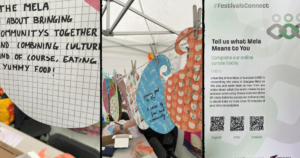Festivals and events can make a significant contribution to bringing communities together but often outcomes are ‘expected’ or ‘presumed’ rather than being empirically demonstrated. On the eve of the UCI World Cycling Championships in Glasgow, Professor David McGillivray, University of West Scotland outlines what they're doing to address this evidence gap.

Activating festivals and events to promote equality, diversity and inclusion goals

Our FestivalsConnect project, funded by Spirit of 2012 is concerned with exploring the relationship between festivals and events of different scale, geographical location, and genre (i.e. sporting or cultural) in strengthening equality, diversity and inclusion outcomes. There is evidence that the rhetoric around using festivals and events to catalyse progressive social change often fails to be translated into tangible actions. In our project, focusing on Glasgow, we are deploying creative research methods that are sensitive to the lived experience(s) and expressed needs of communities to:
“examine the macro, meso and micro (communities) level to understand how festivals and events can be operationalised to strengthen equality, diversity and inclusion (EDI) outcomes” and
“understand how policy ambitions around the delivery of festivals and events for the promotion of equality, diversity and inclusion can be most effectively translated into material action that brings communities together, facilitates encounter and interaction with difference and contributes to creating greater social cohesion.”
We already know that festivals and events can make a significant contribution to bringing communities together, strengthening social capital, enhancing social cohesion, facilitating intercultural encounters and producing convivial environments that foster interaction (see our report on the Social Value of Community Events). However, there is insufficient research that explores the practical effects of participation in, or the presence of, major festivals and events on those living in the cities that host them. Often, outcomes are ‘expected’ or ‘presumed’ rather than being empirically demonstrated. In FestivalsConnect, we seek to address this gap longitudinally, so that we can better understand objectives, expectations, delivery approaches and effects beyond immediate event delivery itself. In order to support policy makers, event organisers and community groups use their collective resources wisely it is imperative that we understand the constraints and enablers of improved equality, diversity and inclusion outcomes through festivals and events.
In June, our research team conducted fieldwork at the Glasgow Mela event, the city’s principal multicultural festival. We explored what Mela meant to those attending, utilising an online survey instrument, vox pop interviews and art-based creative activities.

Throughout August, our focus is on the UCI World Cycling Championships, a large sporting ‘festival’ that has strong commitments to the promotion of equality, diversity and inclusion in all its activities. This is the first time that the World Championships for 13 cycling disciplines have been brought together in a singular event in one place. For this event, the FestivalsConnect team are focusing on issues around race and ethnicity and disability, exploring to what extent a large sport event of this type can effectively involve marginalised populations in their planning and delivery to maximise positive outcomes in the short and medium term. We are looking at both core (sport) and ancillary (cultural) events to assess how the organisers and their various stakeholders are translating policy ambitions into practice on the ground, and with what effect. Ultimately, we want to be able to advise future event hosts as to how to best utilise the connective tissue of major events to benefit the host communities that welcome them. What governance models work best, what messaging reaches the right people and how can momentum generated by the event’s spectacle be sustained after the circus leaves town.
Follow our project over the next few months on Twitter @Fest_Connect and through regular updates from the Centre for Culture, Sport and Events @CCSE_UWS at University of the West of Scotland.
Professor David McGillivray, Principal Investigator, FestivalsConnect @dgmcgillivray
